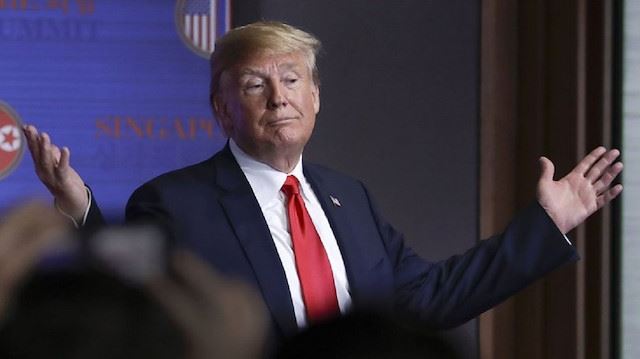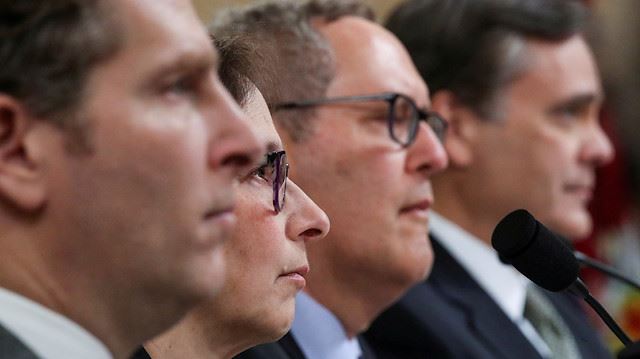U.S. Special representative for Afghanistan Reconciliation is traveling to Afghanistan and Qatar for intra-Afghan negotiations, the State Department s
U.S. Special representative for Afghanistan Reconciliation is traveling to Afghanistan and Qatar for intra-Afghan negotiations, the State Department said Wednesday.
Zalmay Khalilzad departed Tuesday and is currently in Afghanistan where he will meet government representatives and other Afghan leaders.
The U.S. envoy and Afghan leadership will “discuss how best to support accelerated efforts to get all parties to intra-Afghan negotiations,” the agency said in a statement.
“In Doha, Ambassador Khalilzad will rejoin talks with the Taliban to discuss steps that could lead to intra-Afghan negotiations and a peaceful settlement of the war, specifically a reduction in violence that leads to a ceasefire,” it said.
U.S. President Donald Trump made a surprise visit to Afghanistan last Thursday to celebrate the Thanksgiving holiday with American troops.
“The Taliban wants to make a deal, and we’re meeting with them,” Trump said in a meeting with his Afghan counterpart, President Ashraf Ghani, at Bagram Airfield.
On Friday, Qatar-based Al-Jazeera reported the U.S. and Taliban resumed informal talks and met in Doha to discuss the resumption of formal peace discussions.
Trump declared the peace talks with the Taliban “dead” following an attack in the capital Kabul which killed a dozen people in September, including a U.S. service member.
Following Trump’s move, the Taliban opened new battlefronts across the war-weary nation.
US’s House Judiciary Committee opens impeachment hearing
The House of Representatives Judiciary Committee opened its first impeachment hearing into U.S. President Donald Trump on Wednesday as Republicans sought to draw out the process with repeated parliamentary motions.Committee Republicans placed several motions before the committee that when tabled required a roll call vote under committee rules with each member on the panel having to individually voice their support or dissent. All of the motions have been met with party-line votes, and were rejected by the Democratic majority.The hearing is centered on testimony from legal experts who are examining whether Trump’s repeated requests to Ukrainian President Volodymyr Zelensky to publicly declare criminal investigations, including into Democratic challenger Joe Biden, rise to the level of “high crimes and misdemeanors,” the bar set for impeachment.Pentagon warns of ‘potential Iranian aggression’Democrats have called three witnesses to testify Wednesday, among them, Pamela Karlan, a professor at Stanford Law School; Michael Gerhardt, a constitutional law professor at the University of North Carolina; and Noah Feldman, a professor at Harvard Law School.Republicans called George Washington University Law School professor Jonathan Turley.All of the Democratic witnesses testified that the president carried out impeachable offenses with Karlan saying Trump has “doubled down on violating his oath to ‘faithfully execute’ the laws and to ‘protect and defend the Constitution.'””If we are here to keep faith with the Constitution and our Republic, President Trump must be held to account,” she said.What is bribery? Trump impeachment hearing highlights Democrats’ dilemmaTurley, however, said the case against Trump is “slipshod,” questioning the impacts of Trump’s impeachment on future commanders-in-chief.”It is not wrong because President Trump is right,” he said in a 53-page written testimony before the committee. “His call was anything but ‘perfect’ and his reference to the Bidens was highly inappropriate.”But, Turley said, “It is wrong because this is not how an American president should be impeached.”The House’s impeachment investigation is centered on Trump’s multiple requests to Zelensky to declare criminal investigations into Biden and his son, Hunter, as well as claims that it was Ukraine, not Russia, who meddled in the 2016 election.Also at issue is the holdup of $400 million in congressionally appropriated military aid to Ukraine and whether Trump conditioned the release of that assistance and a possible Oval Office meeting with Zelensky on the Ukrainian president publicly announcing the investigations.Trump has repeatedly lashed out at the impeachment probe as a “witch hunt” and denied wrongdoing, ordering his top officials not to participate in the proceedings.Roughly a dozen witnesses have offered sworn public testimony before the Intelligence Committee.Most experts House calls say Trump actions impeachable

What is bribery? Trump impeachment hearing highlights Democrats’ dilemma
What is bribery? The question was robustly debated by legal experts on Wednesday during a congressional hearing in the impeachment inquiry of U.S. President Donald Trump.The back-and-forth highlights a dilemma faced by Democrats seeking to remove Republican Trump from office – whether to make “bribery” one of the formal charges or to use broader wording such as “abuse of power.”The inquiry focuses on Trump’s requests that Ukraine conduct investigations that could benefit him politically and harm Democratic political rival Joe Biden, and $391 million in security aid to Ukraine that Democrats accuse Trump of using as leverage on a vulnerable U.S. ally.”The bribe is to grant or withhold military assistance in return for a public statement of a fake investigation into the elections,” House of Representatives Speaker Nancy Pelosi said on Nov. 14. “That’s bribery.”Trump has dismissed the impeachment inquiry as a partisan witch hunt.There is an obvious appeal to framing Trump’s conduct as bribery, legal experts say: not only is it an easy concept to grasp, but it is one of the two impeachable offenses specifically mentioned in the U.S. Constitution. However, what exactly constitutes “bribery” in the impeachment context is not clear cut.Wednesday’s debate in the House Judiciary Committee centered around two different approaches: The broad Constitutional view that the term encompasses efforts to trade official actions for private benefits, and the narrower modern-day definition used by federal prosecutors in criminal cases.Pamela Karlan, one of three law professors called to the hearing by Democrats, said that she believed that the writers of the Constitution would have thought Trump’s actions rose to the level of bribery.Karlan, a professor at Stanford Law School, said they understood bribery to encompass “when you took private benefits, or asked for private benefits, in return for an official act.”In defining bribery for purposes of impeachment, Congress does not need to adhere to how that crime is defined under federal law, Karlan said.”When they say explicitly in the Constitution that the president can be impeached and removed from office for bribery, they weren’t referring to a statute,” said Karlan.But Jonathan Turley, a scholar chosen to testify by the Republicans, argued that Democrats should stick to a definition of bribery in the U.S. criminal code, which the U.S. Supreme Court said in a 2016 decision should be defined narrowly.The Supreme Court has made clear that “it is a dangerous thing to take a crime like bribery and apply a boundless interpretation,” Turley said, adding “what I would caution the committee is that these crimes have meaning.”Turley, a professor at George Washington University, also testified that in other modern impeachments of U.S. presidents, there was little debate that the alleged wrongdoing violated U.S. criminal laws.
